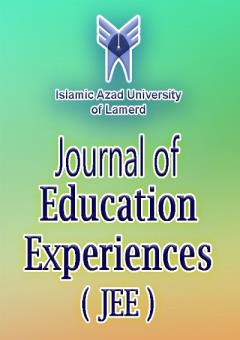Validation of the model for evaluating academic progress in multi-grade classes in elementary schools
محورهای موضوعی : 0
مجتبی سرچهانی
1
,
عباس قلتاش
2
![]() ,
سیداحمد هاشمی
3
,
سیداحمد هاشمی
3
![]() ,
Aliasghar Mashinchi
4
,
Aliasghar Mashinchi
4
1 - دانش اموخته کارشناسی ارشد برنامه ریزی درسی، راهنمای آموزشی، اداره آموزش وپرورش شهرستان نیریز، ایران
2 - دانشيار گروه علوم تربيتي، واحد مرودشت، دانشگاه آزاد اسلامي، مرودشت، ايران
3 - استادتمام گروه علوم تربیتی واحد لامرد
4 - Assistant Professor, Department of Educational Sciences, Lamerd Branch, Islamic Azad University, Lamerd, Iran
کلید واژه: Evaluation, evaluation of academic progress, multi-grade class, evaluation model in multi-grade class,
چکیده مقاله :
Introduction: Multi-grade classes in elementary schools involve the simultaneous education of students from two or more grades in one classroom. The purpose of the study was to validate the model for evaluating academic achievement in multi-grade classes in elementary schools.
Methodology: The research method was descriptive survey type. The statistical population was experts in the field of education and evaluation of academic achievement at the national level, 20 people were selected using the available sampling method, and the list of these components was prepared in the form of a 46-question questionnaire. The questionnaire was provided to the experts in two stages, and after receiving their opinions, CVR and CVI were calculated and the validity of the model was confirmed.
Findings: Considering both CVR indices equal to or greater than 0.49 and CVI greater than 0.79, the model has the necessary and sufficient validity, and it can be said that the components obtained in the qualitative section are the components of the model for evaluating academic progress in multi-grade classes.
Conclusion: Using integrated evaluation along with using various tools to collect information, providing the necessary resources, paying attention to all factors affecting evaluation, removing obstacles and problems, and using appropriate strategies can lead to positive outcomes such as improving the teaching and learning process and strengthening learners' skills in various fields.
References
Adib Manesh, A. (2019). Phenomenology of elementary teachers' experiences from the full implementation of qualitative-descriptive evaluation plan. Spring and summer educational research. No. 38, pp. 60-83
10.52547/erj.6.38.60 (In Persian).
Ball, S. (2017). Evaluating educational programs. In R. E. Bennett & M. von Davier (Eds.), Advancing human assessment: The methodological, psychological and policy contributions of ETS (pp. 341–362). Springer Science + Business Media. https://doi.org/10.1007/978-3-319-58689-2_11.
Chua H, Lee S, Fulmer GW. (2017). Action research on the effect of descriptive and evaluative feedback order on student learning in a specialized mathematics and science secondary school. Asia Pacific Science Education, 3(4): 1-22.
Fadhilla, N, T. (2023). EVALUATION OF LEARNING IN PRIMARY SCHOOLS TO IMPROVE THE QUALITY OF EDUCATION. Edunity, Volume 2 Number 4, April 2023 p- ISSN 2963-3648- e-ISSN 2964-8653. https://edunity.publikasikupublisher.com/index.php/Edunity/index.
Entehaei Arani, A., Vasifian, F., Hosni, M., and Gholtash, A. (2021). Primary school teachers' lived experiences of the functions of the descriptive evaluation model. Education in law enforcement sciences, 9(32), 99-124. (In Persian).
Gu, Y., & Warren, J. (2019). Descriptive evaluation: Challenges and solutions. In Evaluation and Program Planning, 73, 1-10. DOI: 10.1016/j.evalprogplan.2018.11.001.
Hegazi, M. O., Almaslukh, B., & Siddig, K. (2023). A Fuzzy Model for Reasoning and Predicting Student’s Academic Performance. Applied Sciences, 13(8), 5140. https://doi.org/10.3390/app13085140
Heuvel-Panhuizen MV., Sangari, A,A., Veldhuis M. (2021). Teachers’ use of descriptive assessment in primary school mathematics education in Iran. Education Sciences, 11(3): 1-23.
Hosni, M. (2019). Qualitative-descriptive evaluation, care-oriented evaluation. Rosh Madrasa Farda, Volume 12, Number 7, pp. 12-15. (In Persian).
Mortazavizadeh, S. H., Nili, M., Nasrasafhani, A., and Hosni, M. (2018). Analyzing teachers' views regarding the implementation problems of descriptive qualitative evaluation plan in multi-level classes and providing solutions to solve them. Research in Curriculum Planning (Knowledge and Research in Educational Sciences - Curriculum Planning), 15, 30 (consecutive 57), 80-93. (In Persian).
Ostad-Ali, F., Behzadi, M, H., Shahvarani, A. (2015). Descriptive Qualitative Method of Evaluation from the Viewpoint of Math Teachers and Its Comparison with the Quantitative Evaluation (Giving scores) Method (A Case Study on the Primary Schools for Girls in Zone 1 of Tehran City). Mathematics Education Trends and Research, Volume 2015, Issue 1, Year 2015 Article ID metr-00078, 7 Pages doi:10.5899/2015/metr-00078.
Pourmand, R. (2019). Designing and validating the teaching model for multi-level classes and investigating its effect on the learning of students in these classes. Doctoral thesis in the field of educational technology, Faculty of Psychology and Educational Sciences, Allameh Tabatabai University. (In Persian).
Zahida, Parveen., Muhammad. Usman Khalid., Asifa, Rashid. (2023). Exploring the xperiences of Teachers Implementing Action Research in a Multi-Grade Classroom for Physically Challenged Students. Journal of Educational Research & Social Sciences Review, Vol. 3, Issue 2, 2023 .


